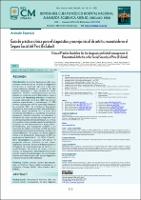Guía de práctica clínica para el diagnóstico y manejo inicial de artritis reumatoide en el Seguro Social del Perú (EsSalud)
Related Resource(s)
http://cmhnaaa.org.pe/ojs/index.php/rcmhnaaa/article/view/1460Date
2021-12-31Author(s)
Salinas, Ariel
Huaringa Marcelo, Jorge
Alfaro Lozano, José
Becerra Chauca, Naysha
Nieto Gutierrez, Wendy
Garcia Gomero, David
De la Jara, Jesús
Calderón Gallegos, Julia
Flores, César
Taype Rondan, Alvaro
Timaná Ruiz, Raúl
Salvador Salvador, Stefany
Carrera Acosta, Lourdes
Gamboa Cárdenas, Rocío
Metadata
Show full item recordAlternate title
Clinical Practice Guideline for the diagnosis and initial management of Rheumatoid Arthritis in the Social Security of Peru (EsSalud)
Abstract
Introducción: La Artritis Reumatoide (AR) tiene adversas consecuencias en la salud su diagnóstico temprano y manejo óptimo requiere recomendaciones basadas en evidencia de alta calidad adaptadas a cada sistema de salud. Objetivo: Proveer recomendaciones clínicas basadas en evidencia para el diagnóstico y manejo inicial de la AR. Material y Métodos: Se conformó un grupo elaborador de la guía (GEG) que incluyó médicos especialistas y metodólogos. El GEG formuló 10 preguntas clínicas a ser respondidas por la presente GPC. Se realizaron búsquedas sistemáticas de la evidencia publicada en PubMed y CENTRAL entre diciembre 2017 a julio 2019 (revisiones sistemáticas y –cuando fue considerado pertinente– estudios primarios). Se seleccionó la evidencia de mayor calidad para responder cada una de las preguntas clínicas planteadas. La certeza de la evidencia fue evaluada usando la metodología Grading of Recommendations Assessment, Development, and Evaluation (GRADE) y en reuniones de trabajo periódicas, el GEG usó dicha metodología para revisar la evidencia y formular las recomendaciones, los puntos de buena práctica clínica y los flujogramas. Finalmente, la GPC fue aprobada con Resolución N° 132 – IETSI – ESSALUD – 2019. Resultados: La presente GPC abordó 10 preguntas clínicas, divididas en dos temas: diagnóstico y manejo. En base a dichas preguntas se formularon 16 recomendaciones (5 fuertes y 11 condicionales), 45 puntos de buena práctica clínica, y 3 flujogramas. Conclusión: El presente artículo resume la metodología y las conclusiones basadas en evidencias de la GPC para el diagnóstico y manejo inicial de la AR en EsSalud. Background: Rheumatoid Arthritis (RA) has
adverse health consequences, its early diagnosis and optimal management require recommendations based on high quality evidence adapted to each health system. Objective: To provide
evidence-based clinical recommendations for the diagnosis and initial management of RA. Material and Methods: A Guideline
Development Group (GDG) was established, including medical specialists and methodologists. The GDG formulated 10 clinical questions to
be answered by this CPG. Systematic searches of published evidence in PubMed and CENTRAL were performed during December 2017 and
July 2019 (including systematic reviews and -when it was considered pertinent- primary studies) were conducted. The evidence of the
highest quality for answering each of the posed clinical questions was selected. The quality of the evidence was evaluated using the
Grading of Recommendations Assessment, Development, and Evaluation (GRADE) methodology which was used in periodic work meetings
by the GDG to review the evidence and formulate the recommendations, points of good clinical practice, and flowcharts. Finally, the CPG
was approved with Resolution N° 132 – IETSI – ESSALUD – 2019. Results: This CPG addressed 10 clinical questions, divided into two topics:
diagnosis and management. Based on these questions, 16 recommendations (5 strong and 11 weak), 28 points of good clinical practice, and
3 flowcharts were formulated. Conclusion: This article summarizes the methodology and evidence-based conclusions from the CPG for
the diagnosis and initial management of RA in EsSalud.
Collections
- Artículos científicos [891]






